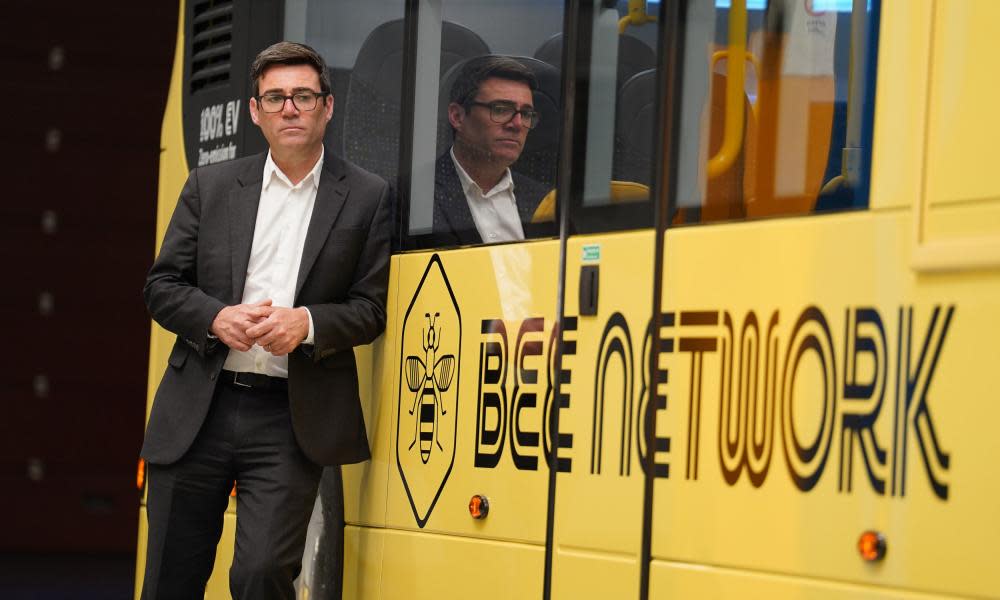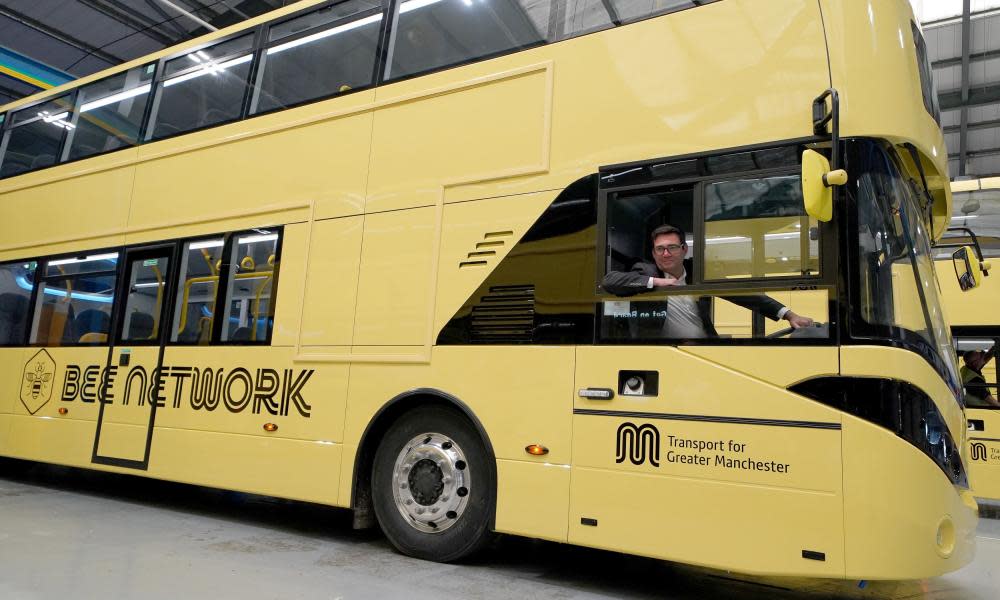Greater Manchester jumps onboard the franchise route to better buses

The first yellow buses are already driving through Greater Manchester’s streets, bold and bright as the change they herald. This month will see the birth of the region’s Bee Network: a system of joined-up, accessible transport that local leaders hope will transform people’s lives for the better.
Buses are at the heart of the change, returning under the region’s control as franchises after nearly four decades of “the chaos of deregulation”, as the mayor, Andy Burnham, terms it.
Travel combining buses and the Metrolink trams – already the same distinctive yellow – will be made cheaper and easier from next week, when the Bee Network app launches, and should be joined up in a London-style contactless fares system by January 2025. By then, every bus will be franchised and branded yellow with the Manchester bee – the city symbol now swarming across bus shelters and signs, as well as the street furniture. The long-term ambition is for the Bee Network to integrate bike hire and commuter rail routes.
But with the sudden disruption of privatisation under the Thatcher government still alive in the memory, Burnham says the region has chosen to move in phases. “It’s not ‘big bang’ – but in Wigan, Bolton and bits of Salford and Bury, it will be very transformational.”
The north-west of Greater Manchester will see the first franchised routes operating on 24 September – including the immediate rollout of 50 brand new, zero-emission buses from the Wigan depot.
“You’re talking of an area that has large amounts of terraced properties directly on the street,” says Burnham. “The old buses, as they pulled away, the noise, the stuff they’d spew out – not great. Electric buses in places like that will significantly improve quality of life from a pollution point of view.”
The outer suburbs are the focus for immediate improvement, with more frequent buses on orbital routes and services tied in with any tram and rail links.
“It will make a massive difference,” says Vernon Everitt, transport commissioner for Greater Manchester. “We can’t change everything overnight, but we can make sure first and last services are properly timed, and gradually start to improve the service, keep fares as low as we can, and drive up the patronage.”

Part of that transformation started a year ago when Burnham introduced a £2 flat fare for buses across the city region, cutting and simplifying the cost for passengers (and drivers).
The mayor has pledged that the flat fare is “absolutely in place until September 2024”, adding: “The more people get onboard, the more we can sustain the flat fare.”
The car remains the predominant mode of transport, accounting for more than 60% of all trips made in the city region. Burnham has opted for a carrot approach to tempt these drivers on to public transport, last year abandoning plans to wield a clean-air-zone stick. He may now be feeling vindicated in this decision, given the backlash his fellow Labour mayor Sadiq Khan has faced over the ultra-low emission zone expansion in London.
The £2 fare is certainly approved of by most passengers around the region – fewer of whom appear aware of the imminent Bee Network. “But I don’t take much notice at 5.30 in the morning,” says one woman in Salford Quays, awaiting a No 53 bus back to north Salford after a shift in Greggs. She used to drive, she says, until the fares tilted the equation: “It’s cheaper to get a bus now – it’s a lot of money, parking.”
Critics – and particularly bus companies, which met the launch of Burnham’s franchising plans five years ago with vituperative opposition – say the financing will never stack up. The cost has been estimated at about £135m of Greater Manchester’s public money, with £15m to £22m annually in direct startup costs including buying up bus depots, aside from the £13m a year allocated to capping fares.
“It is costly,” Burnham admits. “But I would say it’s just frustrating that we’re buying back depots that were taken off us in the 1980s.”
He argues that franchising can nonetheless prove efficient – particularly as bus companies have until now been able to cherrypick lucrative routes, while demanding heavy subsidies from routes that councils have put out to tender. Burnham says: “The deregulated model – it just hands power to the private vested interests. The evidence so far is that franchises per mile are coming out less than tendered services under the old deregulated system. So it’s cheaper.”
Along with the economic uplift from better transport, there should be direct savings, such as in concessionary travel. Free bus travel for 16- to 18-year-olds in Manchester costs the public purse £15m a year in fares paid out to operators, according to Burnham: “Under franchising, it’s just revenue forgone – it will be much lower than that.”
Other transport authorities will be watching to see how his franchising experiment unfolds, with Liverpool and West Yorkshire potentially following suit, after Tyne and Wear’s efforts were fought down a decade ago. One of the most bitterly opposed companies, Stagecoach – which only last year was in the high court trying to block Manchester’s plans – will run most of the city region’s north-east routes from 2024, after winning three big contracts in the second tranche of awards.
For Burnham, the start of franchising is a moment with huge significance, politically and personally, for a man who remembers the overnight disappearance of the “not flashy but well-organised” orange-and-white municipal buses he used as a teenager. He says: “I used to get the 26 bus from Leigh to the Arndale – 10p. Deregulation has been a disaster. It exposes the myth that the market solves everything. It doesn’t – it’s the opposite.”
The ripples from Greater Manchester’s yellow revolution may yet be felt way beyond its buses. Arguing that decarbonisation cannot rely on private investment, Burnham says: “Look at water, the sewage on the beaches and rivers, or electricity … Life’s essentials should be under public control.”


